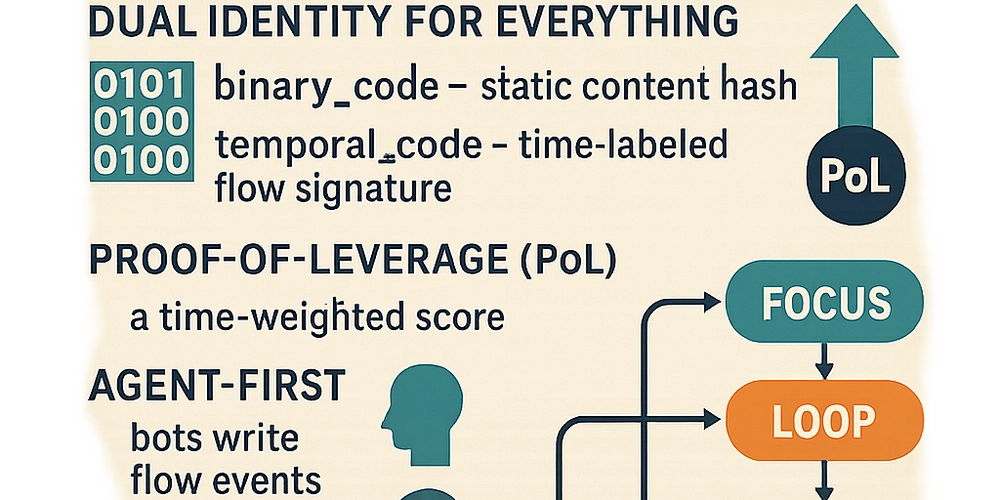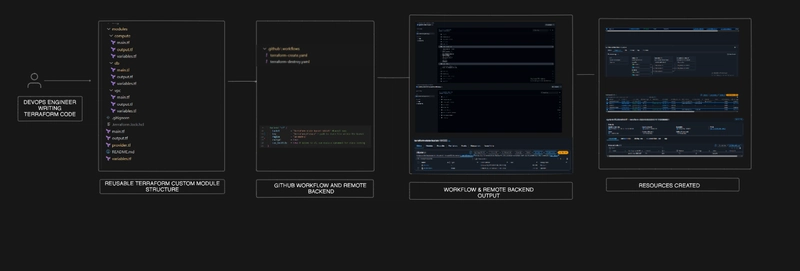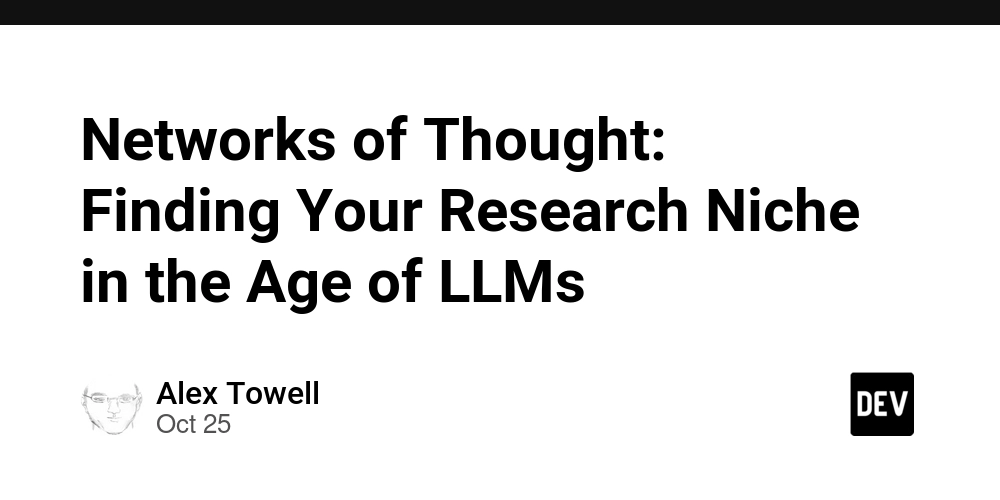Hacktoberfest: Contribution Chronicles
Perfect — here are two ready-to-publish DEV posts you can drop in today to cover the other Hacktoberfest prompts. I kept them judge-friendly, crisp, and very you.
(Prompt: “Highlight the contributions you’re making during Hacktoberfest and what you learned.”)
Title:
I Shipped Proof-of-Leverage on Postgres: My Hacktoberfest Contributions to BINFLOW (Botswana → Web4)
Tags: #hacktoberfest #opensource #postgres #ai #timeseries
TL;DR
During Hacktoberfest I turned a weird idea — measuring influence by usage over time — into working features inside BINFLOW (my Web4 project). I:
- Designed the PoL (Proof-of-Leverage) formula + SQL view
- Logged time-labeled “flow events” in a hypertable
- Added hybrid search (pg_text + vector embeddings)
- Proved agents can fork the DB → propose merges like code
This post documents the exact PRs, queries, and what I learned.
📦 Contributions (PR-by-PR)
1) Time-Labeled Events (Hypertable)
-
PR:
feat(db): flow_events hypertable + triggers - Why: Every “use/modify/publish” must be recorded as motion in time.
- Snippet:
CREATE TABLE flow_events (
event_id BIGSERIAL PRIMARY KEY,
pattern_id UUID REFERENCES patterns(pattern_id) ON DELETE CASCADE,
phase TEXT CHECK (phase IN ('Focus','Loop','Transition','Pause','Emergence')),
action TEXT CHECK (action IN ('create','reuse','modify','publish','healthcheck')),
payload JSONB,
occurred_at TIMESTAMPTZ NOT NULL DEFAULT now()
);
SELECT create_hypertable('flow_events', 'occurred_at', if_not_exists => TRUE);
2) Proof-of-Leverage (PoL) Baseline
-
PR:
feat(pol): materialized view + decay - Why: Influence ≠ ownership. Score should grow with use and phase weight, but decay over time.
CREATE OR REPLACE FUNCTION phase_weight(p TEXT) RETURNS NUMERIC AS $$
SELECT CASE p
WHEN 'Focus' THEN 1.0 WHEN 'Loop' THEN 1.3
WHEN 'Transition' THEN 1.5 WHEN 'Pause' THEN 0.7
WHEN 'Emergence' THEN 1.9 ELSE 1.0 END;
$$ LANGUAGE sql IMMUTABLE;
CREATE VIEW pol_live AS
SELECT p.pattern_id, p.name,
COALESCE(
SUM( LOG(1 + 1) * phase_weight(e.phase) /
NULLIF(1 + sqrt(EXTRACT(EPOCH FROM (now() - p.created_at))/86400)::NUMERIC,0)
), 0
) AS pol_score,
COUNT(e.*) AS event_count
FROM patterns p LEFT JOIN flow_events e USING (pattern_id)
GROUP BY p.pattern_id;
3) Hybrid Search (Text + Vector)
-
PR:
feat(search): pg_text + pgvector hybrid - Why: You should find useful patterns by meaning, not just exact words.
WITH ft AS (
SELECT pattern_id, ts_rank_cd(tsv, plainto_tsquery('english', $1)) AS ft_score
FROM patterns WHERE tsv @@ plainto_tsquery('english', $1)
),
vs AS (
SELECT pattern_id, 1 - (embedding <=> $2::vector) AS vec_score
FROM pattern_embeddings
)
SELECT p.pattern_id, p.name,
COALESCE(ft.ft_score,0) AS ft_score,
COALESCE(vs.vec_score,0) AS vec_score,
(COALESCE(ft.ft_score,0)*0.4 + COALESCE(vs.vec_score,0)*0.6) AS hybrid
FROM patterns p
LEFT JOIN ft USING (pattern_id)
LEFT JOIN vs USING (pattern_id)
ORDER BY hybrid DESC LIMIT 20;
4) Agent Forks → Merge Policy (Prototype)
-
PR:
feat(agents): fork DB; meta-agent approves merges - Why: Agents should experiment safely, then prove their changes increase PoL or quality before merging.
🧪 What worked / what didn’t
Worked
- Postgres as an agent brain (hypertable + materialized views) is shockingly good.
- Hybrid search inside SQL = fewer moving parts, faster iteration.
Didn’t
- Early PoL formula got gamed by rapid “healthcheck” events → added phase weighting + decay.
- Embedding dimensionality must match your model or queries silently underperform (facepalm).
🌍 Why this matters (Botswana → Web4)
I’m building this from Botswana. I don’t have funding; I have ideas, code, and consistency.
BINFLOW is my way of proving that time-aware systems can make the web smarter — not noisier.
🧑💻 How you can jump in
- Good first issue: “PoL v2: phase-aware decay + spam guard.”
- Add an artifact uploader (Fluid Storage/IPFS) that writes URIs into
flow_events.payload. - Build a timeline chart (accessible) for phase shifts.
Repo: (add link)
Demo: (add link)
Contact: peacethabibinflow@proton.me
🎓 Takeaways
- Influence is a time series, not a trophy.
- Databases can be orchestration platforms if you treat forks like sandboxes.
- Building in public forces clarity. 10/10 recommend.
(Prompt: “Reflect on your Hacktoberfest experience and what open source means to you.”)
Title:
Open Source as Rhythm, Not Static: What Hacktoberfest Taught Me While Building BINFLOW
Tags: #hacktoberfest #opensource #postgres #ai #webdev
Opening
Hot take: open source isn’t a license — it’s a tempo.
This month, while hacking on BINFLOW (a time-aware ledger that measures usage over time), I realized why some projects feel alive and others… don’t.
It’s not stars. It’s not hype. It’s whether the project keeps a beat.
Three lessons (that actually changed how I build)
1) Time is a first-class feature
Most repos treat time as metadata. I made it a primary key.
Every meaningful action becomes a flow event (Focus/Loop/Transition/Pause/Emergence). It’s wild how much clarity you get when you log how something lives — not just the final state.
Result: Better tradeoffs, fewer “mysterious regressions,” and a culture of show me the timeline.
2) Influence > Ownership
Open source loves ownership signals (who wrote it, who merged it). Useful, but incomplete.
By computing a Proof-of-Leverage (PoL) score (usage × phase weight × decay), I could surface the quietly useful patterns that no one is hyping but everyone is using.
Result: We promote the right things — not the loudest things.
.
— Peace Thabiwa (Botswana)
📧 peacethabibinflow@proton.me · (add repo/demo links)



